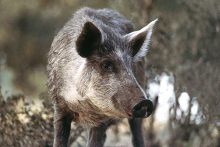| Description | Participants | Summaries | Products | Feature |
|---|
NIMBioS Working Group:
Feral swine / pseudo-rabies in Great Smoky Mountains National Park
A Mad Itch: Controlling Pseudo-rabies in Feral Swine
January 20, 2009
A Mad Itch: Controlling Pseudo-rabies in Feral Swine
January 20, 2009
 Feral swine have been described as the most worrisome of non-native species in the Great Smoky Mountains National Park. These free-roaming pigs not only root out native plants and destroy natural habitats, but can also carry disease, such as pseudo-rabies, which is often fatal if transmitted to other wild and domestic animals.
Feral swine have been described as the most worrisome of non-native species in the Great Smoky Mountains National Park. These free-roaming pigs not only root out native plants and destroy natural habitats, but can also carry disease, such as pseudo-rabies, which is often fatal if transmitted to other wild and domestic animals.
With a goal to manage outbreaks of disease among wild animals in the Smokies as well as other natural areas, the Feral Swine/Pseudo-rabies Working Group at the National Institute for Mathematical and Biological Synthesis (NIMBioS) on the University of Tennessee, Knoxville, campus was initiated through a collaborative effort of mathematical and biological researchers at several academic institutions and wildlife managers at the park.
Current objectives for the Working Group, which holds its second meeting Jan. 25-26, 2010, include mathematical modeling of the feral hog population in the park, investigating prospects for predicting the spread of feral hogs in the southeastern United States, and reviewing the general principles of modeling and management of emerging diseases in feral species.
"What the Working Group is doing with modeling the problem is pretty interesting and useful in terms of showing the impact of hog control as well as showing what would happen if we did nothing to the population," said Bill Stiver, a wildlife biologist in the park and participant in the Working Group.
Despite its name, pseudo-rabies, also called "the mad itch," is not related to rabies and does not infect humans, but to wild canines, including coyotes and foxes, the disease is fatal, so wildlife managers want to ensure that they eliminate as many hogs as possible. In 2009, more than 600 hogs had to be removed from the park.
The Feral Swine/Pseudo-rabies Working Group co-organizers are Graham Hickling, research associate professor in the department of forestry, wildlife and fisheries at UT Knoxville and NIMBioS associate director of partner relations; Suzanne Lenhart, professor of mathematics at UT Knoxville and NIMBioS associate director for education, outreach and diversity; and Les Real, professor of biology at Emory University.
NIMBioS Working Groups are comprised of 10-15 invited participants and focus on specific questions related to mathematical biology. Each group typically meets two to three times over the course of two years at the Institute.
The National Institute for Mathematical and Biological Synthesis (NIMBioS) brings together researchers from around the world to collaborate across disciplinary boundaries to investigate solutions to basic and applied problems in the life sciences. NIMBioS is funded by the National Science Foundation in collaboration with the U.S. Department of Homeland Security and the U.S. Department of Agriculture, with additional support from The University of Tennessee, Knoxville.
NIMBioS
1122 Volunteer Blvd., Suite 106
University of Tennessee
Knoxville,
TN 37996-3410
PH: (865) 974-9334
FAX: (865) 974-9461
Contact NIMBioS


